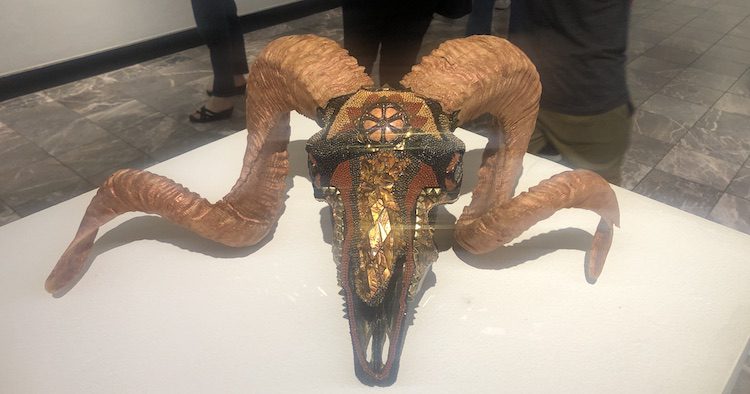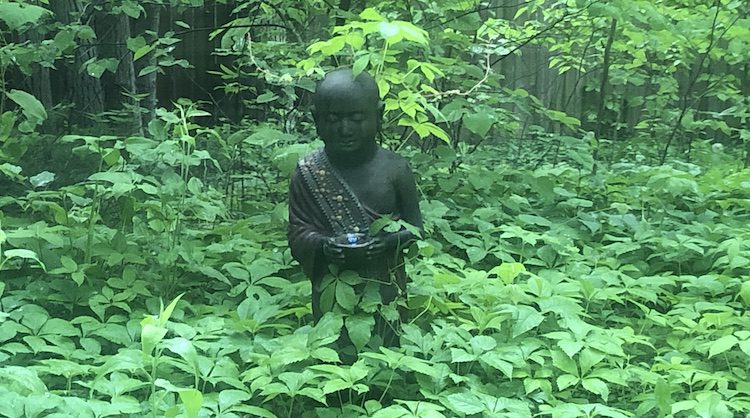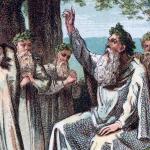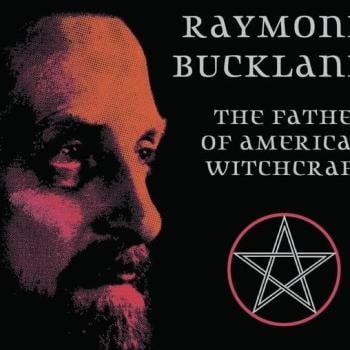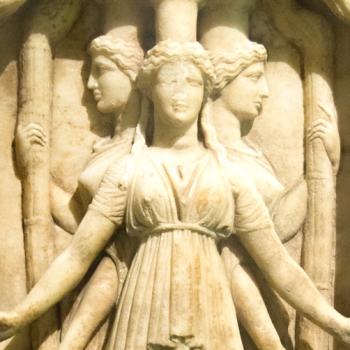I noticed someone on social media lamenting a Christian Witches convention that took place in Salem Massachusetts this past April. Never mind that the event is already over with, I’m much more bothered by the policing of both the Witch and Christian worlds, and the idea that there’s “no such thing as a Christian witch.”
I’ll admit that that I don’t understand people self-identifying as Christian Witches in the Pagan world, but I don’t have to understand something to be accepting of it. There are also a whole lot of Witchcraft Traditions that have Christianity quietly tucked into their DNA somewhere. Nothing emerges in a vacuum and for the last 1700 years Christianity has been the elephant in the room, it’s only logical that a whole lot of Witch traditions might have been influenced by Christianity.
Modern Witchcraft is not an offshoot of Christianity, but Christianity has impacted at least a bit of what some of us do. Christianity has also influenced Buddhism, Hinduism, and Islam over the last 1500 years, and ancient paganisms influenced Christianity and Judaism two thousand years ago (and in the case of Judaism further out than that). This is how religions and belief systems work, to think that the Witch community somehow stands outside of that paradigm is sheer hubris.
“One document consisted of notes originally taken by a man who was initiated into a magical group of four elderly women the Oxfordshire village in which he lived in the years around 1940. They were a part of the teachings of this group, and consisted of the various magical uses to which twenty-six of the biblical psalms could be put, sometimes consisting of the the whole psalm and sometimes of a single verse. They are obviously classic Christian folk magick, of a sort recorded copiously from the early Middle Ages to the twentieth century, although the special importance of the psalms to Protestants would suggest that this use of them post-dates the Reformation.” -Ronald Hutton writing on a witch book owned by Andrew Chumbley in Triumph of the Moon, in 1999 (pages 306-307).
You may not have heard of Andrew Chumbley, but his impact on Modern Witchcraft over the last 20 years has been extraordinary. Much of the current rise in “Traditional Witchcraft” can be traced in no small part to the work of Chumbley, who spent years documenting magickal techniques and practices, most notably his own Sabbatic Tradition. Chumbley wasn’t a Christian, but if he used the text written about above in his magickal work, he was most certainly influenced by Christianity. And in the world of Traditional Witchcraft such influences are common, not outliers. (And Chumbley is also majorly responsible for the boom in high quality Witchcraft books from speciality publishers.)
The first person most of us think of when it comes to Traditional Witchcraft is Robert Cochrane, whose Witch group was (and still is) The Clan of Tubal Cain. Tubal Cain was a famous Hebrew blacksmith, not a figure from Greek mythology. Traditional Witchcraft also often references figures such as Lucifer or the Devil, and we all know where he came from.
I just picked up my copy of The Red Goddess and immediately noticed the quotation from Song of Songs (that’s a book in the Bible) on the back, not to mention all the quotes from the book of Revelation which feature prominently in its text. And if you read a lot of Traditional Witchcraft books you’ve no doubt run into figures such as the Nephilim, Watchers, and Enoch. Where do people think this stuff comes from?
In addition there’s a long history of Christians using magick. If your practice is influenced by charmers or cunning-folk you are utilizing techniques practiced overwhelmingly by self-identifying Christians. Are you into Pennsylvania Dutch Pow-Wow? That’s another thing developed by Christians.
Wiccan-Witchcraft has also been impacted by Christianity. The early modern grimoires which helped to shape a lot of Wiccan ritual practices were mostly written by Christians, and those that weren’t were written by Muslims and Jews. The names of many of those grimoires give away their Biblical roots. The Key of Solomon, The Sixth and Seventh Books of Moses, and The Grimoire of Pope Honorius were all allegedly written by Biblical or Christian figures. And don’t overlook just how impactful some of these books have been on Wicca especially, there’s a lot of stuff in my BoS that reads like it came straight from The Key of Solomon.
Wiccan-Witches have borrowed a whole lot of stuff from Freemasonry over the years, from vocabulary to ritual techniques, and the early Masons were overwhelmingly Christian. Many of Masonries most esoteric architects were Christian too, and I’m sure some of us have taken a little from them over the years too. Groups such as the Theosophical Society honored Jesus, and one of my all-time favorite occultists, Dion Fortune, always found time for her Master Jesus.
So yeah, we probably owe Christians at least a small debt of gratitude for many of our practices. Today we call many of these things “Witchcraft” so it makes sense that Christians looking to engage in these practices might call themselves Christian Witches.
Many Witches who seem aghast at the idea of Christian Witches in their midst often quote the Bible to back up their outrage. (And when you think about it, isn’t that an odd choice? Why do we give a shit about what’s in the Bible?) One of the most quoted passages is from Paul’s Book of Galatians, Chapter 5, verses 19-21:
“The acts of the flesh are obvious: sexual immorality, impurity and debauchery; idolatry and witchcraft; hatred, discord, jealousy, fits of rage, selfish ambition, dissensions, factions and envy; drunkenness, orgies, and the like. I warn you, as I did before, that those who live like this will not inherit the kingdom of God.” -New International Version
But the word “witchcraft” can have a whole host of different meanings, and its use probably comes down to who is doing the translating. Look here, we get “sorcery” instead of “witchcraft.” (And really, most people are guilty of all these things, why single out magickal practice?):
“Now the works of the flesh are evident: sexual immorality, impurity, sensuality, idolatry, sorcery, enmity, strife, jealousy, fits of anger, rivalries, dissensions, divisions, envy, drunkenness, orgies, and things like these. I warn you, as I warned you before, that those who do such things will not inherit the kingdom of God.” -English Standard Version
The Bible says a lot of different shit, most of which is ignored by Christians. Why fixate on just the Witchcraft? That doesn’t make any sense to me.
General religious and spiritual identities are malleable. There are thousands of different types of Christianity, hundreds of different types of Witchcraft. Nobody owns the definition of Christian which is why there are Mormons, Catholics, Baptists, Seventh-Day Adventists, Progressive Christians, and Jehovah’s Witnesses. Many of these groups disagree on all sorts of issues, but you can’t stop any of them from using the word Christian. (Though there are people in each group who do their best to try and own the word, and they all fail outside of their smaller faith communities.)
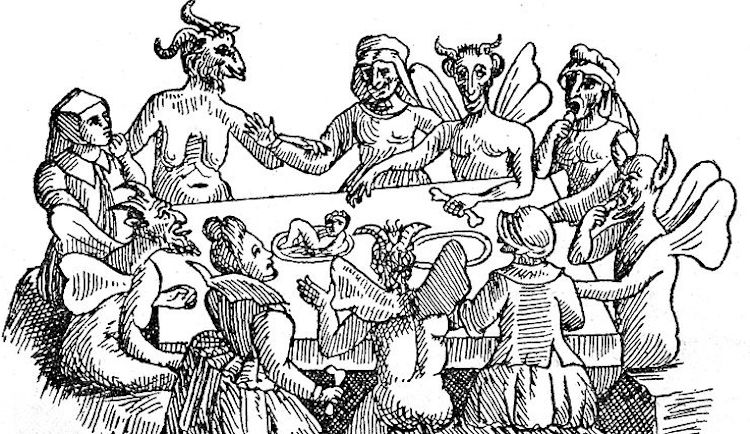
If Witchcraft is simply a magickal practice, void of religion or spirituality (which is how the word is used by many today) how can there not be Christian Witches? That’s like saying that there can’t be Jewish herbalists. Certainly the idea of Witchcraft is not compatible with an overwhelming majority of Christians, but if it works for some people who really cares? It doesn’t hurt you or hurt me unless the Christian-Witches suddenly start speaking for all of us.
Witchcraft is empowering, I’ll all in for anyone with an open mind using it to take charge of their life. I’m all for more Witches in the world, not less.
Note: There are also lots of spiritual and magickal traditions that are sometimes labeled witchcraft without most practitioners identifying that way. Practices such as Voudun, New Orleans Voodoo, Santeria, and Hoodoo have always contained Christian elements. Marie Laveau while being the High Priestess of New Orleans Voodoo, for example, also strongly identified as a Catholic. But the majority of those practitioners do not self-identify as witches, which is why they are not included in this article. And I have a long standing practice of not lumping everyone into the “witchcraft category” unless they deliberately choose to identify that way.


